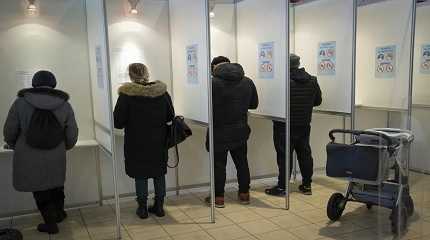
TALLINN, Estonia (AP) — Estonians were voting Sunday in a general election that the center-right Reform Party of Prime Minister Kaja Kallas. one of Europe’s most outspoken supporters of Ukraine, is a favorite to win.
She faces a challenge from the populist opposition EKRE party that is seeking to limit the Baltic nation’s exposure to the Ukraine crisis and is blaming the government for citizens’ economic misery.
Over 900,000 people are eligible to cast ballots Sunday to pick representatives to Estonia’s 101-seat Parliament, or Riigikogu, from a range of nine political parties. Nearly half of the eligible voters have already voted in advance. Many Estonians prefer to vote electronically, casting votes from their computers.
National security in the wake of neighboring Russia’s assault of Ukraine and social-economic issues, particularly the rising cost of living, have been the main themes of the election.
Kallas, 45, has emerged in the past year of war as one of Europe’s most outspoken supporters of Ukraine. Holding the country’s top post since 2021, she’s seeking a second term, with her standing enhanced by her international appeals to impose sanctions on Moscow.
Five parties are currently represented at the Parliament. Kallas’ Reform Party heads the current three-party coalition government with the small conservative Fatherland party and the Social Democrats
A Baltic nation of 1.3 million people that borders Russia to the east, Estonia broke away from the Soviet Union in 1991 and has taken a clear Western course, joining NATO and the European Union.
Polls indicate Kallas’ center-right liberal Reform Party is likely to win more votes than any other party. Her main challenger is Martin Helme, head of the nationalist far-right EKRE party, which faults Kallas for the country’s inflation rate of 18.6% — one of the EU’s highest — and accuses her of undermining Estonia’s defenses by giving weapons to Ukraine.
The outspoken and polarizing EKRE entered into the mainstream of Estonian politics in the 2019 election when it emerged as the third largest party with nearly 18% of votes.
The euroskeptic party, which has ridden on the wave of political populism in Europe, was co-founded by Martin Helme’s father, Mart Helme. EKRE and the father-son duo have been embroiled in various political scandals in the past years due to their controversial public comments, particularly during 2019-21 when the party was part of a Center Party-led government.




